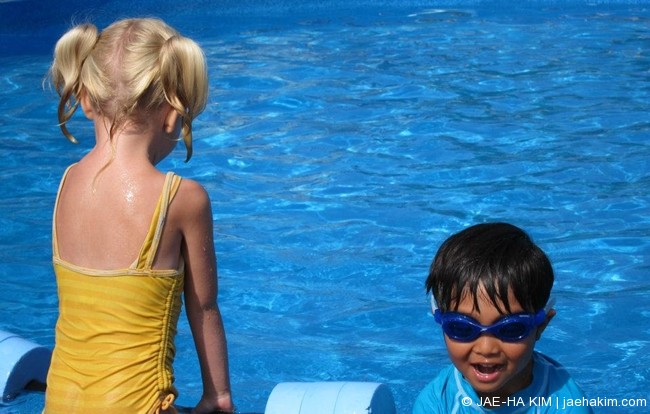By Jae-Ha Kim
jaehakim.com
May 30, 2013
Summer. This is how it should be. And, needless to say, these two are going to be trouble. 😉
This photo was taken about a year ago, when Kyle and Maddie took semi-private swimming lessons with a college student at her family’s pool. She was a wonderful instructor. But, she got an internship and isn’t teaching this summer. Yay for her! But boo for us.
So this year, a friend and I signed up our sons for lessons at our local high school, which has a very strong swim program. Both boys are the same age, same height and have similar swimming “abilities” (e.g. they can swim for a short distance, but have the flailing technique of the average 5-year-old).
When it came time to start the class, the instructors divided the seven children into two groups. My son’s little pal was placed with a pair of students his age, both of whom were more advanced swimmers who had taken lessons there in previous months. My son, on the other hand, was placed in a group with a trio of 3-year-olds, two of whom cried for their mom (as they would each week) and wanted to be held by the instructor.
During the first class, the teacher seemed surprised that my son had no fear of jumping to the bottom of the pool and swimming back to the top. I told her, “He’s had lessons for two years already. He can swim.”
I assumed that during the second class, the kids would be moved around according to skill level. It would’ve made sense to leave the three youngest children who weren’t comfortable in the water — and who needed the most attention — together. It seemed logical that they would move Kyle over to the older group that was actually learning some technique, rather than just learning how to dunk their heads.
Nope. Didn’t happen.
Third class. Same thing.
Fourth class. Ditto.
In Malcolm Gladwell’s book “Outliers: The Story of Success,” he presents some theories as to why certain groups of people excel and others do not. Often, the answer is opportunity. For instance, a child may show aptitude for sports earlier than his classmates. So, he is put on the fast track for elite sports. Given the jump start he has, his classmates won’t be able to catch up with him. Similarly, kids who are determined to be smart are accelerated academically and placed in classes where they are taught at an advanced level.
For too long, Asians have had a reputation as being meek, smart, well disciplined and bad at sports. Look at Jeremy Lin. Despite playing at an elite level and leading his high school and college teams to championships, he was overlooked by the NBA. Maybe the instructors saw Kyle and his blue-eyed, blond-haired friend and assumed that my son would be the weaker swimmer. I’m sure they never heard of Olympic gold medalist swimmer Park Tae-hwan, who is the Michael Phelps of Korea.
Maybe it was all a coincidence. But the fact remains that the allocation of who went into which group was illogical.
If I could go back in time, I would’ve addressed this more firmly with the head of the swim program. I wouldn’t have just hinted and made suggestions.
Why wasn’t I more firm? Because my friends’ children take lessons there. Because I assumed that by the following week, they’d get their act together. But, more likely, because I didn’t want to be that mom.
For the record, I’m not delusional when it comes to my son’s athletic abilities. His BFF excels in gymnastics. I’m convinced one of his other buddies will be headed for the NHL. And another can pitch and catch a ball like nobody’s business. My little guy can’t throw a ball to save his life. (Yet.)
But, he’s a smart, agile kid who learned to ride a Razr at 3 and had his training wheels taken off his bicycle on his 4th birthday. He likes challenges. My goal for him isn’t to become an Olympian like Park or Phelps, who — by the way — tweeted a good luck message for my little guy. I’d like him to learn how to swim better so that he is safe in the water and doesn’t fear it the way I do.
Kyle didn’t learn anything in this program. And that’s a fail on the part of both the school and myself.
But, lesson learned. My son starts swimming lessons at a new venue in two weeks.
© 2013 JAE-HA KIM | All Rights Reserved







I love it! (You really are in for trouble)
LOL! The other day, that little cutie pie wanted Kyle to get his truck out. I asked if she wanted to drive it. She said, “No, I want Kyle to drive me around.” 🙂
Cutie pies <3
I was .8 away from all American and look at park taehwan
I have never heard of this stereotype before but three words: Park. Tae. Hwan.
That’s ridiculious. I would be switching pools for sure… and I would tell the owner of the pool why.
Ok AK, Im still confused. So, if you hpaepn to have two mother tongues, that doesn’t count as bilingualism? And everyone who learns English as a second language does so at the behest of the US or some other greater power? Not because it behooves them to do so? How about all the people in the US who don’t speak English (of which there were plenty in just little Rhodey). Should they suddenly become bilingual even though they’ve been there, operating for decades very happily without it? I just don’t get what your point is. I know so many Americans who are bi-lingual or more. I don’t know where you’re from, but clearly it’s not where I am. I guess what you’re suggesting is that people should learn a language just because it’s the “right” thing to do? Because it makes you special? Are you a polyglot of some merit? I’ve spent the last 2 years studying Korean, just for the sake of it, because it’s all but useless to me. Maybe I’m not really American though. But in all seriousness, the suggestion that you’re making is that the 46 some odd million people who speak something other than English at home, should first become fluent English speakers and then go learn another language because as people with mother tongues other than English don’t count as bilingual. Or perhaps you’re suggesting that the millions of people who emigrated to the US should, after generations, reconnect to their roots for the purposes of going back to where they came from? Or perhaps white people who spend the majority of their life in the interior of a massive piece of land spend time and money to learn a language on the off chance that they leave the country? In which case, they should probably choose a language that is widely spoken around the world because you never know where you’re gonna go. So, well naturally English is an unacceptable language to speak, perhaps Chinese should be the choice (oh dear, but which dialect?). After all, after a long day driving a tractor through the cornfields, farmers in the end really want to go to Shenyang. It seems to me there are lots of bilingual people in the US. Those people are either recent immigrants and their children and people with more money and time to spend on learning something that may or may not benefit them in the slightest.
No question this is the place to get this info, tnhkas y’all.
And may your little guy become the next Park Tae Hwan!
This doesn’t sit well with me. It sounds like it could do with race and also stupidity and/or laziness
, how many Americans speak a laaugnge other than the laaugnge of their heritage? I don’t think your experience reflects American society in general. Most Americans speak one laaugnge and that’s English, especially the older generation. These days, America is more multi-cultural than ever so yeah, kids probably speak more of a 2nd laaugnge. But how many Americans genuinely learn a 2nd laaugnge outside of their own heritage and become fluent in it? I would say a very small percentage.Chitchatting with busboys and taking an order down isn’t what I would call proficient. One could learn that much Spanish in probably as little as a few months of intensive studying.Darth, I think you are an exception rather than the rule. Are you telling me that most Canadians are fluent in French? From the Canadians I have met thus far, most learned French yet can’t really speak it. Of course there were some that were immersed in it and speak it fluently. But considering the amount of French that is taught, the fluency rate is pretty low. Same goes for America, most Americans know some basic Spanish but yet cannot hold a conversation in it even with the amount of Spanish speakers in the country.
It sounds like at best these teachers are clueless and at worst they’re racist and incompetent. But your son an dhis friend are adorbs! I’m glad you’re taking him to a new instructor.
Advice from an older mom: Be “that” mom! You won’t regret it your later years when you reflect back. Wish I had been that mom in a couple of instances!
Moms and dads, what would you do if you saw that your child was put in class that was too basic for him? I’d like to think I’d get it resolved, but I’m too much of a people pleaser sometimes to speak up. This is an interesting blog post.
Which city do you live in? It seems like a lot of your posts veer towards racist experiences that you and your son have had. I would have thought that in a country like the US, this would be such old news.
Desmond, I live in the Chicago area. And you’d think that this was old news, right? Just for perspective, Jeremy Lin is half my age. Just three years ago, he was playing college ball at Harvard against many other “elite” schools that had a reputation for having open-minded students. Yet he was called a chink and ridiculed for being Asian. It saddens me that this kind of talk — which was common during my elementary school days — hasn’t disappeared by now.
Lin has talked about how people perceived him as weak, because he’s Asian. I concur with his assessment. My guess is that if he had been white or African American, prospective coaches wouldn’t have given his abilities the sideeye that they did.
I realize that it may seem like I’m writing about incidents that are happening now. But many of my posts are about things that have happened in the past. I just never wrote about them before. I didn’t talk about it growing up, because it was humiliating and I didn’t want my parents to worry. However, now that I’m a parent, I want to protect my child from this kind of hurt. I know that there’s only so much I can do. But writing about it puts it out there that this crap still happens.
I’ve had a few friends say, “Really? This happens today? I’ve never seen it.” I’m glad they never experienced it. I wish other people hadn’t either.
I’ve accumulated a lifetime of memories, mostly good. Those stories eke out every now and again, too. 😉
gah. that’s so frustrating. i didn’t realize there was a stereotype about Asians not being able to swim well (-_-) what a bunch of crap.
That’s one of the biggest preombls with US education. That Americans have no motivation to learn about other cultures and languages. Why must Americans go to Europe/Asia/all over the world and the locals have to adapt themselves to the Americans? That’s exactly what Obama was saying. At least Koreans are making an effort, some more than others, to learn a new language. Whether the intention is because of their own interest or not is not the matter. Compare that to Americans who just have no interest in anything beyond the borders of the US.Now there are a lot of Koreans who just generally refrain from speaking in English with other Koreans. But there are also a lot of Koreans who would like to, but just don’t really have the opportunity to. Things are changing more and more these days compared to even 5-10 years ago. There are many more opportunities these days which is a good thing.So yes, many Koreans don’t utilize all the opportunities out there and still have a ways to go develop their speaking skills. However, Korea is generally tons better than China and especially Japan when it comes to speaking English. America on the other hand may not spend a lot of money on learning foreign languages but that doesn’t take away from the fact that Americans still do learn foreign languages for years in middle/high school and university but don’t really have anything to show for it as well other than a “adios/gracias/merci beacoup”. But look at how many English speaking people there are here compared to the millions of Spanish-speaking people that make up America and the French-speaking people in Canada for one. You can’t even begin to compare that. One could argue a person has many many more opportunities to engage in and study about Spanish/French in America/Canada than speak English in Korea.
Good idea. Get him outta there!
Hi, I think your website might be having browser compatibility issues. When I look at your website in Chrome, it looks fine but when opening in Internet Explorer, it has some overlapping. I just wanted to give you a quick heads up! Other then that, very good blog!
Year-round swim training designed to keep kids at top fitness levels. 3 sessions per week.
Thank you for your article.Thanks Again. Awesome.
Usually I do not learn article on blogs, but I would like to say that this write-up very forced me to take a look at and do so! Your writing style has been surprised me. Thank you, quite nice post.
Greetings! Really beneficial guidance on this informative article!